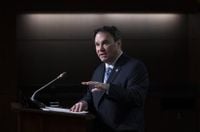On May 7, 2025, the New Democratic Party of Canada (NDP) appointed Don Davies as its interim leader, a decision made just a week after the party suffered a significant defeat in the federal election held on April 28. This leadership change comes in the wake of former leader Jagmeet Singh’s resignation, announced on election night, May 5.
Davies, who has represented the Vancouver-Kingsway riding since 2008, is stepping into the role with a solid political background. He has been re-elected multiple times, most recently in the 2025 election. Born in Alberta, Davies moved to Vancouver in 1991 and has a rich history in labor advocacy, having served as the director of legal services for Teamsters Canada before entering Parliament.
In a press release following his appointment, Davies emphasized the need for the NDP to reconnect with working people. “We need to take a hard look at how we got to where we are, and we need a clear view of where we’re going,” he stated. His vision includes making homes affordable amidst the current housing crisis, enhancing health care services, and advocating for better wages across Canada.
Mary Shortall, the NDP President, expressed confidence in Davies, stating, “New Democrats remain united in our mission to deliver for people across the country.” She acknowledged the disappointing election results but reiterated the party's commitment to addressing critical issues like public health care and affordable housing.
Former MP Alistair MacGregor congratulated Davies on social media, noting the significant rebuilding needed for the party. “There’s a lot of rebuilding to do in the weeks and months ahead, but I know Don has the capabilities and experience to get our party on that path,” he said.
Davies’ interim leadership comes at a challenging time for the NDP, which will enter the 45th Parliament without official party status. This is a stark contrast to their previous standing, having dropped from 25 seats in the 2021 election to just seven in 2025. Official party status requires a minimum of 12 MPs, which the NDP failed to achieve.
Svend Robinson, a former NDP MP, recalled the difficulties faced by the party after its losses in the 1993 election, describing it as “the Parliament from hell.” He noted that the NDP struggled to exert influence during that period, a sentiment echoed by political analysts today. Jonathan Malloy, a political science professor at Carleton University, commented on the NDP's potential for influence in a minority government, stating that while they may have some bargaining power, it is limited.
With the loss of official party status, the NDP faces significant financial challenges. The party will miss out on millions of dollars in funding that is available to parties with more than 12 members in the House of Commons. The baseline funding for an opposition party leader’s office is around $1.1 million, which will be drastically reduced for the NDP.
Davies has committed to a grassroots review of the party’s recent election performance, recognizing the need to rebuild from the ground up. “We need to reconnect with working people and show them that the NDP is their party, the one that fights and delivers for them,” he said.
Singh, who led the NDP since 2017, leaves behind a mixed legacy. Under his leadership, significant advancements were made in child care, dental care, and access to medications for many Canadians. The NDP acknowledged his contributions, stating, “Jagmeet Singh led the party with courage, compassion, and a clear commitment to improving life for working people.”
As the NDP prepares for the upcoming parliamentary session starting on May 26, 2025, it faces the daunting task of redefining its role in Canadian politics. With only seven seats, the party will have to find innovative ways to advocate for its priorities, including affordable housing and healthcare expansion.
Former NDP MLA Nathan Cullen remarked on the decision to appoint Davies as interim leader, calling it a crucial step in the rebuilding process. “Don & the caucus will be focused & united to pave the way for a new leader,” he said.
The NDP’s current situation highlights the broader challenges faced by left-leaning parties in Canada, particularly within the first-past-the-post electoral system, which often favors larger parties like the Liberals and Conservatives. The NDP's struggle to articulate its successes and maintain a distinct identity has been a longstanding issue that Davies will need to address.
As the NDP looks to the future, the party's ability to effectively communicate its values and priorities will be essential in regaining the trust of its constituents. The upcoming months will be crucial for Davies as he leads the party through this transitional phase, aiming to reinvigorate the NDP’s connection with its base and the broader Canadian public.
In the face of adversity, Davies and the NDP are determined to forge a path forward, focusing on the issues that resonate with Canadians. The interim leader’s commitment to grassroots engagement and a clear vision for the party’s future will be vital as the NDP seeks to re-establish itself as a formidable force in Canadian politics.






